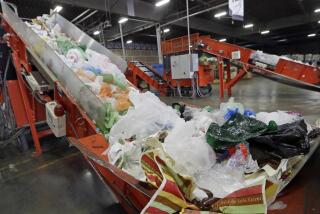Letters to the Editor: Use plastic bags or catch coronavirus is a false choice
- Share via
To the editor: The safety of front-line workers and efforts to flatten the COVID-19 curve are our top priorities right now. However, there is no reason to encourage the use of disposable plastic bags.
No evidence supports disposable plastics as less likely than reusable items to spread COVID-19. However, there is ample evidence showing that less than 10% of all plastic ever produced has been recycled, and that it pollutes our environment and communities.
Plastic is a petroleum product produced by the fossil fuel industry and contributes greatly to air and water pollution. This harms public health, especially for communities near extraction sites and refineries.
Based on Heal the Bay’s beach cleanup data, we have seen a marked reduction of plastic bags at beaches and rivers since the bag ban went into place locally in 2014. We do not want to go back to a time when these bags littered our communities just to benefit the fossil fuel industry.
Emily Parker, Santa Monica
The writer is a marine scientist with Heal the Bay.
..
To the editor: Pick your risk — possible exposure to germs on reusable shopping bags, or the known risk of plastic bag pollution to the environment?
We know that plastic bags, together with plastic packaging and products, break down and enter the food chain once in the environment. The risk to habitats and wildlife is well documented. The risk to humans of consuming plastic-tainted food remains to be seen.
The answer to minimizing our exposure to the coronavirus is not to use plastic bags. Both risks can be managed: Sanitize your reusable shopping bags, and continue efforts to reduce plastic pollution.
Heidrun Mumper-Drumm, Pasadena
The writer is director of sustainability initiatives at ArtCenter College of Design.
..
To the editor: While the L.A. Times Editorial Board’s stance on reducing plastic waste deserves praise, the real question should be why the state’s “pioneering” bag ban was considered a ban at all.
Walk into any grocery store or pharmacy, and one will notice fairly quickly that the banned disposable plastic bags have been replaced by, well, disposable plastic bags.
Like their predecessors, the new plastic bags are neither re-used nor recycled. They are, however, much thicker, and retailers now charge 10 cents per bag (sparingly, in my experience). How your editorial board, the state government and grocers consider this meaningful progress toward reducing plastic waste is beyond me.
Reagan McClymonds, Los Angeles
More to Read
A cure for the common opinion
Get thought-provoking perspectives with our weekly newsletter.
You may occasionally receive promotional content from the Los Angeles Times.









